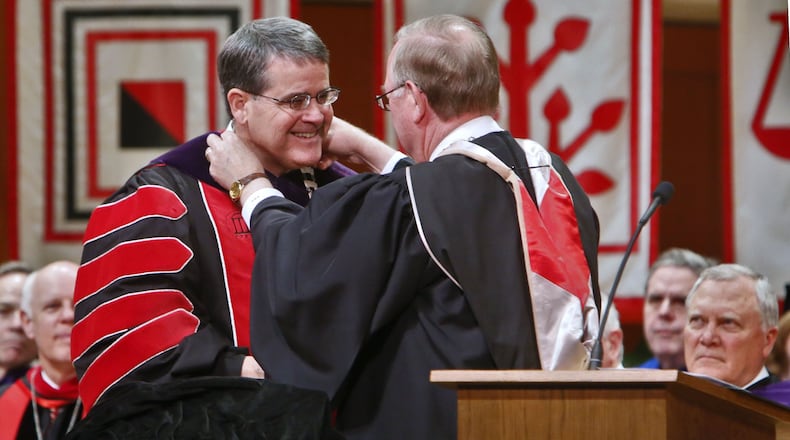DESTIN, Fla. — University of Georgia president Jere Morehead fills many chairs, from acting as SEC president to serving on the NCAA board of governors and board of directors.
But no seat has been hotter than the one Morehead filled Tuesday on SEC Network’s beachside stage for “The Paul Finebaum Show.”
Morehead answered for the NCAA’s challenges, past and present, amid the unprecedented and unintended overhaul to the amateurism model after the passing of NIL and one-time transfer legislation last summer.
“It’s a mess, to be honest with you,” Morehead said at the onset, quickly gaining credibility with the live national TV audience as one might expect from a former assistant U.S. Attorney in the Department of Justice and a renowned jury expert.
“We have to make sure we don’t lose what is unique in college athletics.”
The explosive and well-documented war of words between Alabama coach Nick Saban and Texas A&M coach Jimbo Fisher two weeks ago has dominated headlines, with NIL issues at its root.
The NIL is not supposed to be used to induce or influence recruits in their choice of school.
Morehead and his national championship football coach, Kirby Smart, have voiced concern over recruits potentially choosing schools based on the highest bidder.
Finebaum dug deep into Morehead for answers to problems this new NCAA model has created.
How, Finebaum pressed, can fans have faith that this “shattered” NCAA organization will solve and enforce the necessary rules?
“Unless Congress acts, the NCAA is our organization, it’s what we have,” Morehead calmly responded.
“We have to work through the process, and we have to do our best to enforce the rules that we have. We can’t lose faith with what we have. We have to work to reform it and make it better.”
Morehead acknowledged these are “complicated times” when Finebaum charged that there is selfishness among some schools despite the crisis.
“But we also have some great leaders,” Morehead countered, “so I’m not giving up on it.”
Finebaum said Thursday that Morehead was the first school president to appear live on stage at SEC spring meetings.
“I didn’t intend to be cross-examining a former U.S. attorney, but these are important questions college athletics are facing,” Finebaum said.
“The conference office recognizes him as one of the most important and influential college presidents, not only in the SEC, but all of college football,” he said, “so we weren’t going to be asking what kind of tomatoes he’s growing in his garden.”
Indeed, with NCAA president Mark Emmert’s announcement that he’s stepping down from his role in June 2023, collegiate athletics’ governing body is in need of the leadership and direction that Morehead seems poised to provide.
Morehead proved up to more challenges beyond Finebaum’s 15-minute cross-examination.
School was back in session when the 65-year-old law professor was chased down by media members in a hotel hallway Wednesday to answer the question as to how the NCAA could govern NIL with the threat of antitrust lawsuits.
“You’re making an assumption that whatever guard rails created are ones that wouldn’t survive a litigation review,” Morehead said. “I’m also a lawyer, and I think we can devise rules that have the potential of surviving scrutiny.
“If the NCAA enforcement staff cannot solve the challenges created by NIL, Congress becomes the only remaining option in creating some reasonable guard rails.”
Many have jumped to the conclusion that, without subpoena power, the NCAA enforcement staff is powerless to uphold the current legislation.
Morehead was in the room with other members of the board of directors when they directed the enforcement staff to “pursue cases as they have in the past, where they believe the NIL is coming into conflict with NCAA rules and launch investigations.
“I think this was just the first step,” Morehead warned. “It wouldn’t surprise me to see the enforcement staff or the board of directors take further action in the future.
“If the NCAA enforcement staff cannot solve the challenges created by the NIL, Congress becomes our only remaining option in creating some reasonable guard rails.
“I think we’re really at the height of college athletics, and I’m optimistic about the future.”
The SEC Meetings conclude Friday, with league presidents and athletic directors expected to address new schedule models, potentially voting on them.
About the Author
Keep Reading
The Latest
Featured

